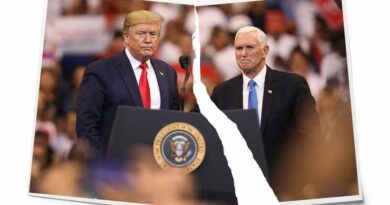Who are the 14 House Republicans who voted against Juneteenth? And why did they vote no?
Story Highlights
- All 14 members of Congress who voted against making Juneteenth a federal holiday were Republicans.
- Rep. Thomas Massie argued calling Juneteenth a national independence day would confuse people.
- "We have enough federal holidays right now," said Rep. Ronny Jackson.
WASHINGTON — Legislation to recognize June 19, or “Juneteenth,” as a federal holiday passed overwhelmingly in the House of Representatives Wednesday. The bill passed unanimously in the Senate on Tuesday.
Senate Bill 475, the “Juneteenth National Independence Day Act”, passed with 415-14 votes. The bill recognizes June 19, 1865, the day enslaved people in Galveston, Texas learned slavery was ended, as a public holiday. President Abraham Lincoln’s Emancipation Proclamation had freed all enslaved African Americans in rebel states two and a half years earlier.
The bill now heads to President Joe Biden’s desk to be signed into law.
The 14 no votes were all from Republican members of Congress. They include:
- Rep. Mo Brooks, R-Ala.
- Rep. Andy Biggs, R-Ariz.
- Rep. Scott DesJarlais, R-Tenn.
- Rep. Tom Tiffany, R-Wis.
- Rep. Doug LaMalfa, R-Calif.
- Rep. Mike Rogers, R-Ala.
- Rep. Ralph Norman, R-S.C.
- Rep. Chip Roy, R-Texas
- Rep. Paul Gosar, R-Ariz.
- Rep. Tom McClintock, R-Calif.
- Rep. Matt Rosendale, R-Mont.
- Rep. Ronny Jackson, R-Texas
- Rep. Thomas Massie, R-Ky.
- Rep. Andrew Clyde, R-Ga.
Several of those representatives shared why they were voting against the bill.
Rep. Ronny Jackson, R-Texas, told USA TODAY he thinks there are enough federal holidays.
“We have enough federal holidays right now. I just don’t see the reason in doing it,” he said. “I don’t think it rises to the level I’m going to support it.”
Republican Montana Rep. Matt Rosendale released a statement on his vote against S.B. 475.
“Let’s call an ace an ace. This is an effort by the Left to create a day out of whole cloth to celebrate identity politics as part of its larger efforts to make Critical Race Theory the reigning ideology of our country. Since I believe in treating everyone equally, regardless of race, and that we should be focused on what unites us rather than our differences, I will vote no,” Rosendale said.
Rep. Thomas Massie, R-Ky., argued that referring to Juneteenth as a national independence day would confuse people.
“I fully support creating a day to celebrate the abolition of slavery, a dark portion of our nation’s history. However, naming this day ‘national independence day’ will create confusion and push Americans to pick one of those two days as their independence day based on their racial identity,” Massie said on the House floor. “Why can’t we name this ’emancipation day’ and come together as Americans and celebrate that day together as Americans?”
Rep. Chip Roy, R-Texas, also objected to the name of the bill.
“Juneteenth should be commemorated as the expression of the realization of the end of slavery in the United States – and I commend those who worked for its passage,” Roy said in a statement.
“I could not vote for this bill, however, because the holiday should not be called ‘Juneteenth National Independence Day’ but rather, ‘Juneteenth National Emancipation [or Freedom or otherwise] Day.’ This name needlessly divides our nation on a matter that should instead bring us together by creating a separate Independence Day based on the color of one’s skin,” he said.
The Atlanta Journal-Constitution reported Rep. Andrew Clyde, the only member of the Georgia delegation to vote no, declined to answer a reporter’s question about his vote.
Contributing: Savannah Behrmann
Source: Read Full Article

